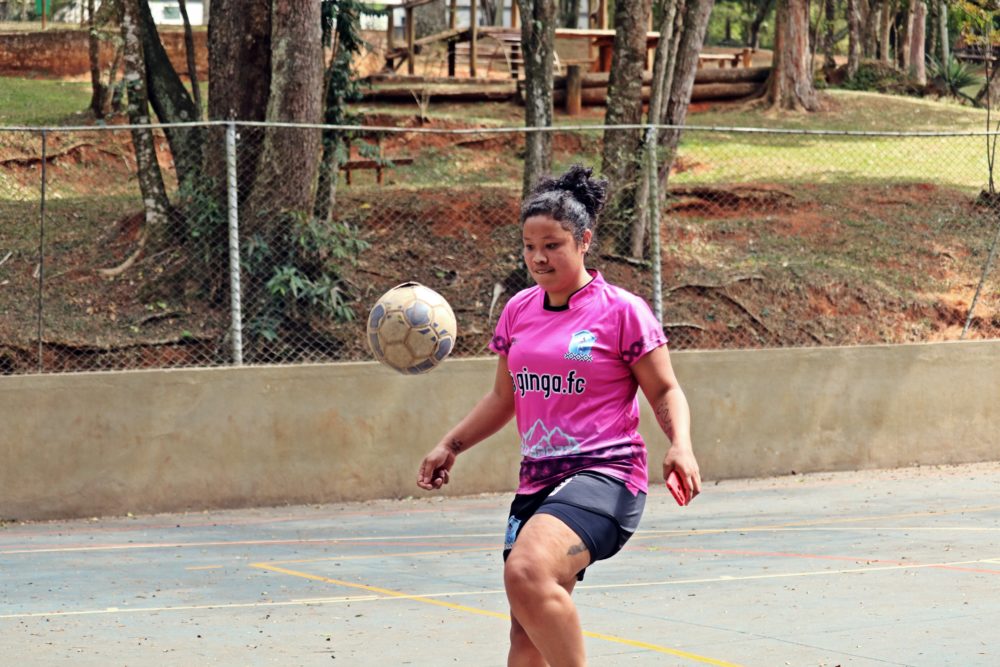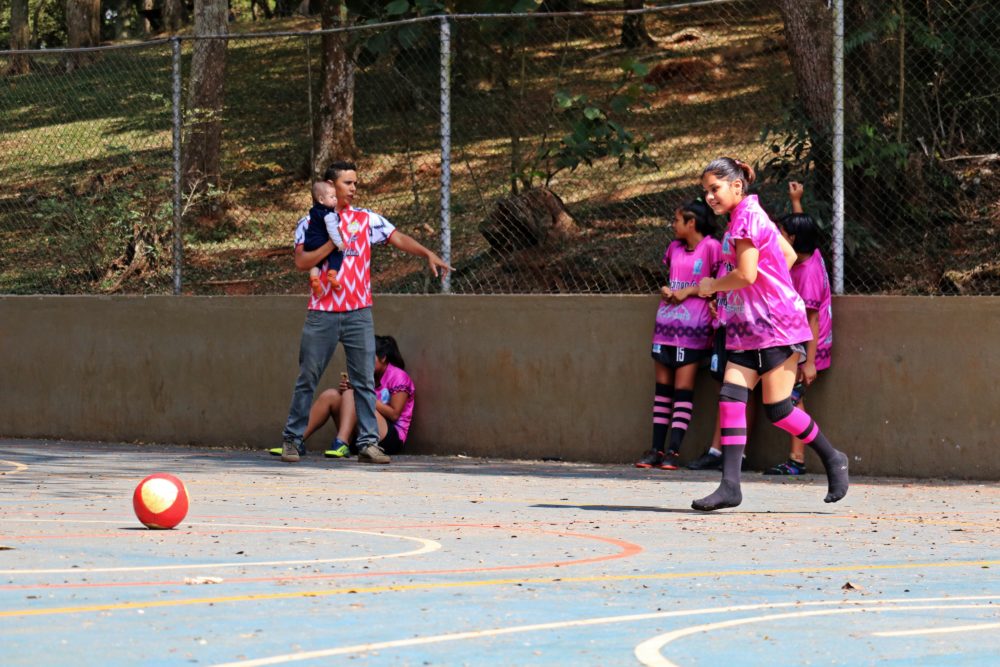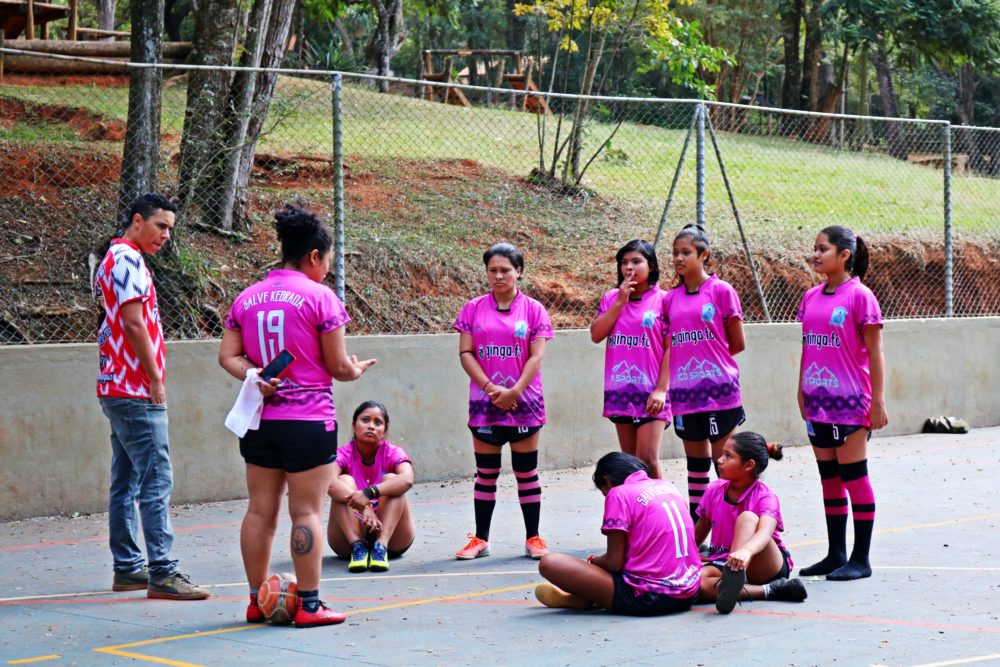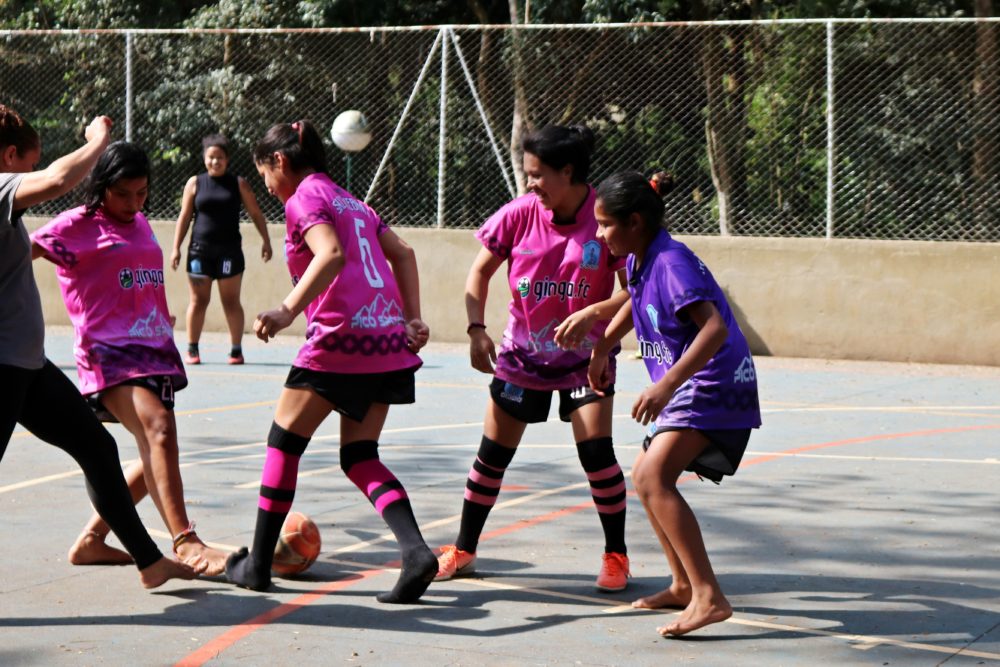By Ira Romão, from Agência Mural*
The Jaraguá indigenous land is made up of 6 villages where the team’s players live. It is located around the Jaraguá Peak, in the Northeast region of the city of São Paulo
The 32-year-old goalkeeper, Jacileide Martins, known as Jaci, is aware that due to her age it will be difficult to have a professional football career. However, she recognizes the importance of Xondarias Guarani for the future, an indigenous female football team from Jaraguá, Northeast region of São Paulo.
“I am [in the team] to encourage the girls. Women with a totally different culture, with kids and jobs, are overcoming difficulties by taking their children to training, to the pitch and football matches. That is what makes us different, we are true warriors by still being able to keep the Xondarias Guarani team going”, Jaci says proudly, from the Tekoa Ytu Indian village.

No wonder Xondarias means warriors in Guarani. You only have to watch a few minutes of the training of the 15 indigenous Guarani women of various ages, to realize that the chosen name could not be any other.
Officially, Xondarias Guarani has existed since January 2019. Resulting from the merging of two old female teams from the community, the Real Guarani and the Soberanas. The indigenous women with a passion for football have been fighting since 2001 to be able to play and show their football skills, including within the Jaraguá indigenous land, made up of these villages: Tekoa Pyau, Tekoa Itakupe, Tekoa Ytu, Tekoa Ita Vera, Tekoa Ita Endy e Tekoa Yvy Porã.
During the training sessions, which take place every Wednesday and Friday, from 12 noon to 2pm, on the Parque Estadual do Jaraguá football pitch, as well as focusing on the trainer’s instructions, the players take turns to look after the children, as some are still in the breastfeeding stage.

“The majority of them have children and few know someone who can look after them. So, they bring them to the games”, explains the team’s trainer, Rodrigo Benevenuto, 31 years old, who also helps out by taking care of the children.
Benevenuto is part of the Salve Quebrada Collective, which is based in the Jaraguá neighborhood, and is currently making a documentary about amateur football in the region. This is how the collective, in partnership with the Ginga.FC movement, got involved with the female indigenous teams. Upon seeing the individual talents and the sheer potential of the group, they proposed to bring the teams together.
The idea was to strengthen female indigenous football, help to look for sponsors and getting hold of footballs and kits, as well as creating a games schedule for the new team for friendly games, festivals and championships beyond the villages. However, Benevenuto soon became responsible for the players’ technical, emotional and physical preparation.

The initial idea was to bring all football teams together to play on the pitch. But female football is already difficult. It is even more difficult with the indigenous women as they have less support and face more discrimination. So, futsal, by using smaller groups, having more pitches, became the most feasible option”, explains the trainer.
From the end of the year until now, the Xondarias have taken part in more than 10 friendly games, three festivals and one championship. For Jaci, taking part in friendly games and futsal championships outside of the indigenous community, as well as offering improvements in technique and individual skills, brought joy and maturity to the team.
“It is hope for all of us. Some people think of giving up, but when they see that we are taking part and improving, they hang in there. It is a certain way of looking, we are in a team and it’s not me that is playing. We all are. We are the Xondarias.”

Vanessa Fernandes dos Santos, 18 years old, from the Tekoa Ytu village, better known as Nega, is a right winger and stands out as one of the best in the team. She, as many of the players, is reserved, but when she is playing and scores a goal, she represents the Guarani women’s passion for football.
“I feel important. Both by scoring a goal and helping the team. So, for me, taking part and helping the girls leaves me very happy”, shares Nega.
For the team’s development, getting more supporters and fans is really important for Xondarias Guarani to achieve its dreams and attract new talents in the indigenous community, as well as continuing the Jaraguá indigenous female team.
The opportunity to have experiences such as this one could be a lot closer than you think! Have a go taking part in Challenge Day. The campaign takes place every year on the last Wednesday of May. There are over 3 thousand cities that get involved, both in Brazil and in 13 countries of the American continent such as Argentina, Chile, Cuba, Mexico, Dominican Republic, Uruguay and Venezuela. Find out more!
*Series of reports produced by Agência Mural de Jornal das Periferias, whose mission is to minimize the existing gap of information and contribute to the deconstruction of stereotypes about the peripheries of Greater São Paulo.